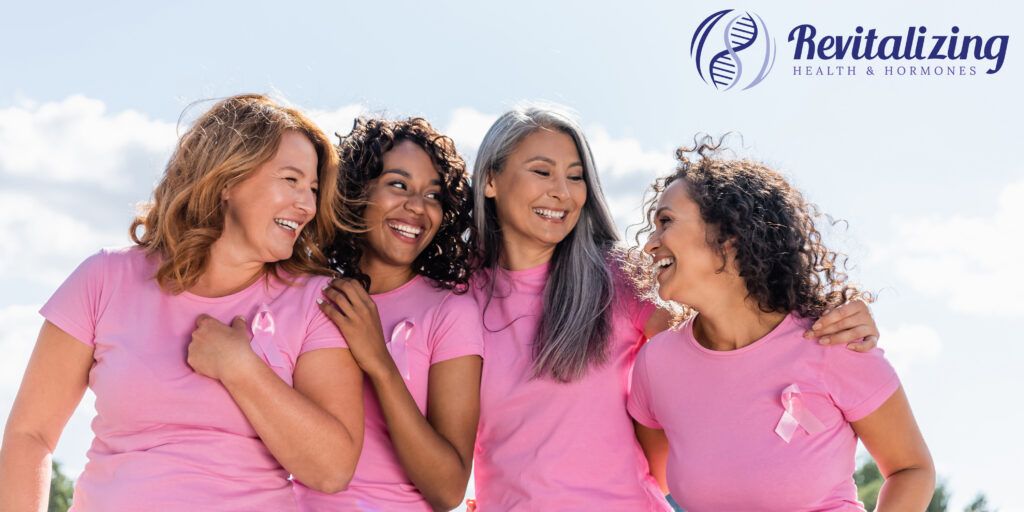When it comes to women’s health, few topics stir more fear and uncertainty than breast cancer. Each year, more than 240,000 women in the U.S. are diagnosed, and many are left wondering how their hormones, and especially hormone replacement therapy (HRT), play a role.
At Revitalizing Health & Hormones, we believe knowledge is power. Too often, women are told to fear hormones when in reality, the right kind of hormone optimization may actually help protect breast tissue. Today, we’ll explore the hormone receptor model and what it means for breast cancer risk, prevention, and even survivorship.
Why Hormone Balance Matters
For decades, conventional medicine has linked estrogen exposure to breast cancer risk. That’s why many women worry about HRT after menopause. But newer research suggests the story is more complex. It’s not just about how much estrogen is in the bloodstream; it’s about how hormones interact with specific receptors inside breast cells.
Think of your breast cells as having “locks” (receptors) that hormones can switch on or off:
- Estrogen receptors (ER-alpha): When overstimulated, they can fuel cell growth.
- Progesterone receptors: Depending on the type, they can either slow or encourage growth.
- Androgen receptors (AR): The most widely expressed in breast tissue. When activated by testosterone, they often slow growth and promote cell death.
In other words, while estrogen sometimes acts like an accelerator, testosterone can serve as a natural brake.
Breast Cancer Types and Receptors
Breast cancer is not one single disease, it has multiple subtypes, and receptor status matters. Luminal A cancers tend to grow slowly and respond well to treatment, while Luminal B cancers are faster growing and more aggressive. Triple-negative cancers, which lack estrogen, progesterone, and HER2 receptors, are harder to treat, yet nearly 60% still have androgen receptors. HER2-enriched cancers spread quickly, while “normal-like” tumors resemble Luminal A and have relatively good outcomes.
Across these subtypes, one theme stands out: tumors with androgen receptors are generally smaller, less aggressive, and linked with better survival.
What the Research Shows
The connection between testosterone and breast cancer has been studied for decades, and the findings are encouraging:
- Women with lower levels of bioavailable testosterone are more likely to develop breast cancer.
- Subcutaneous testosterone therapy (pellet therapy) has been linked to reduced breast cancer incidence compared to national averages.
- Tumors with androgen receptors often respond better to treatment and have lower recurrence rates.
- Historical research even used testosterone to treat breast cancer before modern drugs like tamoxifen came along.
Instead of being something to fear, testosterone may actually be part of the solution.
What This Means for Women Considering Hormone Therapy
If you’re navigating menopause or struggling with symptoms like fatigue, brain fog, low libido, or weight changes, the idea of hormone therapy can feel intimidating, especially if breast cancer runs in your family. But evidence shows that proper hormone optimization, especially with testosterone and estradiol pellets, may not only ease symptoms but also reduce risk.
Even breast cancer survivors may benefit from carefully managed testosterone therapy, with the potential to improve both quality of life and survival outcomes. And for women with genetic risks, like BRCA1 or BRCA2 mutations, personalized screening and treatment are key.
The Bottom Line
Breast cancer risk isn’t just about estrogen levels; it’s about hormone balance and how those hormones interact with receptors in breast tissue. Testosterone plays a surprisingly protective role by activating androgen receptors and slowing abnormal cell growth.
At Revitalizing Health & Hormones, we offer advanced testing, personalized treatment plans, and compassionate care to help you make the best choices for your body. If you’ve avoided hormone therapy out of fear, now is the time to revisit the science and see what’s possible.





